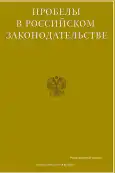Investigation of Crimes in the Sphere of Intended Distribution of Deliberately False Information in the Mass Media
- Authors: Kardanov R.R.1
-
Affiliations:
- North Caucasus Institute for Advanced Studies (branch) of the Krasnodar University of the Ministry of Internal Affairs of Russia
- Issue: Vol 15, No 3 (2022)
- Pages: 19-23
- Section: Articles
- URL: https://bakhtiniada.ru/2072-3164/article/view/147468
- ID: 147468
Cite item
Abstract
The mass media are the most accessible source of information and have a significant impact on people's lives, on the development of Russian society and the state. Media coverage of events taking place in the country and the world leads to an aggravation of social contradictions and a significant surge in crime associated with the dissemination of deliberately false information. Crimes in the sphere of deliberate dissemination of deliberately false information in the media have significant specifics of the subject composition. Due to the specifics of the named criminal act, special attention of law enforcement agencies should be paid to solving issues related to the methodology for detecting and investigating the crimes in question in the context of the development of the information society in Russia, taking into account the transformations of social activity due to world processes taking place in society and the state.
Full Text
##article.viewOnOriginalSite##About the authors
Ruslan Reyzaevich Kardanov
North Caucasus Institute for Advanced Studies (branch) of the Krasnodar University of the Ministry of Internal Affairs of Russia
Email: lel4993@mail.ru
Cand.Sci.(Law), Police Colonel, Head of the Organization of Law Enforcement Activities Department Nalchik, Russia
References
- Bychkov V.V. Administrative and criminal liability for public dissemination of deliberately false information about the coronavirus infection COVID-19 // Actual problems of medicine and biology. 2021. No. 1.
- Bychkov V.V. Public dissemination of deliberately false information about circumstances that pose a threat to the life and safety of citizens, and socially significant information that entailed grave consequences (Articles 207.1, 207.2 of the Criminal Code of the Russian Federation): criminal law characteristics and comparative analysis // Bulletin of the Academy of the Investigative Committee of the Russian Federation. 2020. No. 2 (24).
- Gelyakhova L.A., Kumysheva M.K. On the issue of improving the institution of criminal liability in a pandemic // Gaps in Russian legislation. 2021. Vol. 14. No. 6.
- Gelyakhova L.A., Mashekuasheva M.Kh. Actual issues of bringing to responsibility for the public dissemination of knowingly false information about circumstances that pose a threat to the life and safety of citizens // Gaps in Russian legislation. 2021. Vol. 14. No. 5.
- Golyandin N.P., Verkhovetsky I.V., Sheriev A.M. Countering the use of Internet resources in the dissemination of deliberately false information (fakes) during periods of exacerbation of the socio-political situation on the territory of the subjects of the North Caucasus Federal District // Gaps in Russian legislation. 2020. Vol. 13. No. 4.
- Ilyashenko A.N., Khisamova Z.I. On some aspects of bringing to criminal responsibility for the dissemination of fake news in social networks in a pandemic // Russian investigator. 2020. No. 9.
- Nabiullina V.R. Criminal liability for public dissemination of knowingly false information (Articles 207.1 and 207.2 of the Criminal Code of the Russian Federation) // Altai Legal Bulletin. 2021. No. 2 (34).
- Review of certain issues of judicial practice related to the application of legislation and measures to counteract the spread of a new coronavirus infection (COVID-19) No. 2 in the Russian Federation (approved by the Presidium of the Supreme Court of the Russian Federation on April 30, 2020) // Bulletin of the Supreme Court of the Russian Federation. 2020. No. 6.
- Ovsyannikov S.A., Moshkina N.A. Administrative liability for offenses infringing on public order, public safety and management order. Saratov, 2019.
Supplementary files








